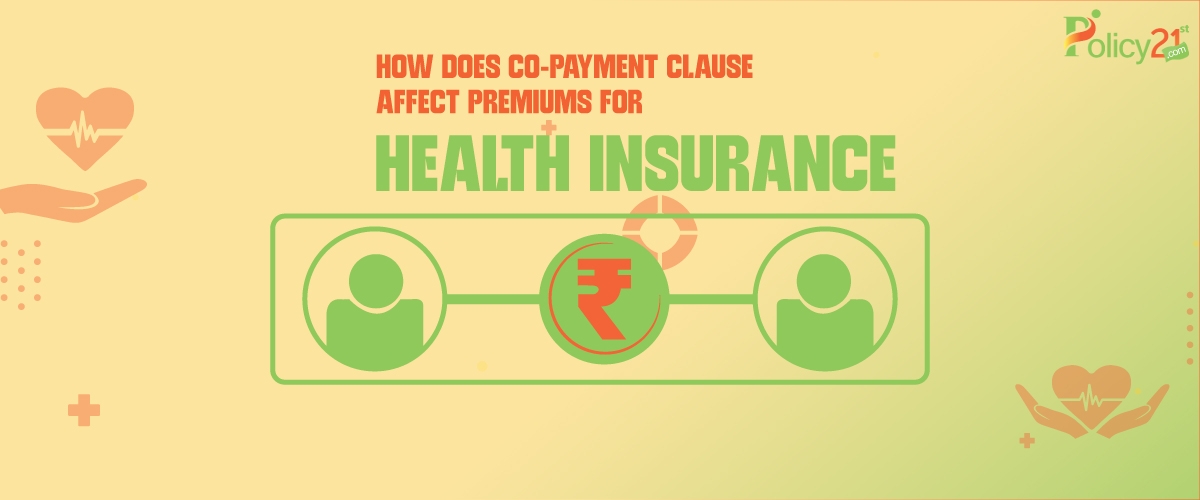What is Co-Payment?
When referring to health insurance, the term “Co-Payment” describes the amount of the claim that the policyholder is required to pay out of pocket, with the insurance company paying the remaining balance. While some health insurance plans mandate a co-payment, many insurance companies also provide options for free co-payments. Owners of policies have the opportunity to obtain health insurance with a minimal co-pay and benefit from a discounted price.
Health insurance policies with co-payment clauses tend to be more affordable since they lessen the insurer’s responsibility by splitting losses between the insured and the insurer. A health insurance policy, for instance, has a 10% co-payment provision and a claim of Rs. 50,000 occurs within the policy’s term. The insured will then be expected to pay 10% of the total, or Rs. 5,000, out of his or her own pocket if the claim request is allowed, with the insurance company covering the remaining amount, or Rs. 45,000.
How Does A Health Insurance Co-Payment Work?
There are two ways for an insured person to file a claim: cashless or by paying for expenses. The health insurance company pays the healthcare where the patient or family members are getting care directly for the expenses incurred when a patient submits a claim and chooses to receive cashless medical care. The health insurance company, on the other hand, reimburses the insured for the expenses incurred while they were having treatment when a reimbursement claim is submitted.
Speaking of co-payment in both scenarios, it is discovered that: Insurers who choose a higher co-pay will be able to lower their total premium payment but will be required to pay a greater amount during a claim; on the other hand, if the insured choose a smaller co-pay the amount that must be paid during a claim is decreased, although doing so results in a higher premium for their health insurance.
Have Any Question?
Ask us anything, We would love to answer!
Features Of A Co-Payment Clause -
- In the co-pay clause, the health insurance provider covers the majority of the claim costs, with the insured responsible for a predetermined amount of the out-of-pocket costs.
- The amount of the co-payment is determined by the healthcare service used.
- The insured must pay a greater premium if they choose a lesser co-payment amount.
- Senior citizen health insurance plans have co-pay provisions in place.
- Co-payment is primarily used in urban areas where the cost of treatment is higher than in smaller towns and cities.
Why Are Co-Pay Clauses In Policies Included?
Co-payment clauses are common in health insurance plans provided by insurance companies because they allow them to save money on claims. The following list includes further justifications for the co-payment provision in health insurance policies:
People are deterred from filing false claims since they must pay a percentage out of their own pockets, therefore they may decide not to because it would increase their expenditures. As a result, there are fewer claims made, particularly in cases of common colds and other mild ailments like frequent gastrointestinal pain. Both parties’ paperwork is reduced as a result. In other words, the co-payment provision prevents the insured from making false claims.
Points To Remember Before Buying a Policy With a Co-Payment Clause -
- Although the co-payment clause in your health insurance policy could seem inexpensive to you, it's crucial to consider your needs first before making a choice.
- Before choosing a plan with co-pay options, you must make sure you have enough money to pay for your share of the healthcare and hospitalization expenditures.
- Although co-payment options in health insurance plans may seem like an excellent solution, they do not significantly lower the financial burden in the event of medical crises.
- It is recommended that you select health insurance without a co-payment clause if you are not prepared for the potential terms and circumstances that come with one.
Final Thoughts- Why Do Assured Insurers Choose Not To Provide Co-Payment Clauses?
The insured person may choose not to file a claim even for life-saving healthcare if the co-payment level is excessively high, which entirely defeats the point of having health insurance coverage. So, having a health insurance plan with a heavy co-payment is essentially the same as not having insurance. Additionally, not everyone could afford to pay for significant healthcare costs out of their own pocket, therefore they wouldn’t choose a health insurance plan with a large co-payment. Furthermore, Policy21st also recommends you to do the same.
In India, the availability of health insurance is already below average, and when co-payment or co-insurance clauses are included in health insurance policies, policyholders are much less likely to purchase them. People are less inclined to select health insurance plans with a co-payment clause because they prefer those that provide them with full cost-protection against medical bills. Because of how this affects an insurance company’s sales, few insurance providers choose to provide health insurance plans that include a co-payment clause. Even while co-payment restrictions in health insurance plans make them more cost-effective to purchase, it is important to identify coverage needs before you limit your options.
Have Any Question?
Ask us anything, We would love to answer!




